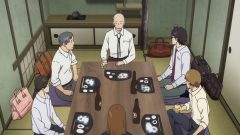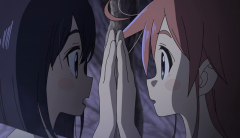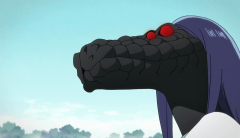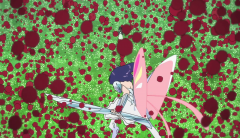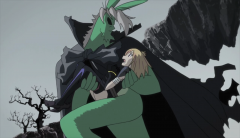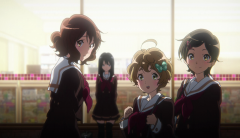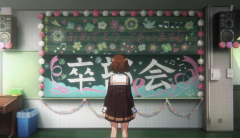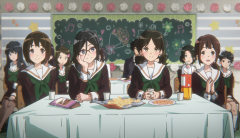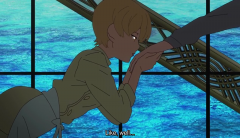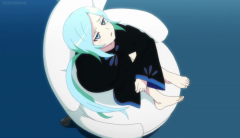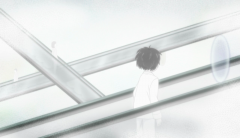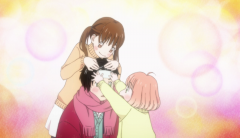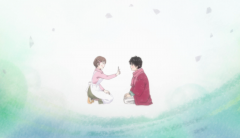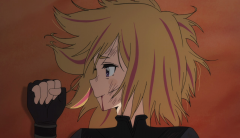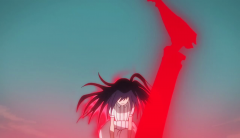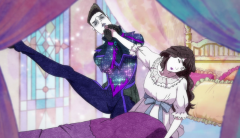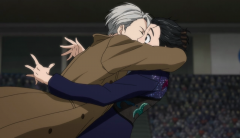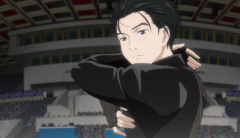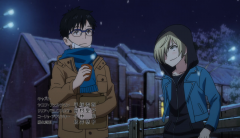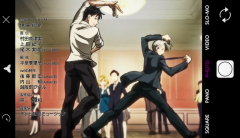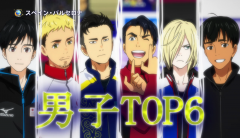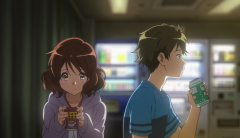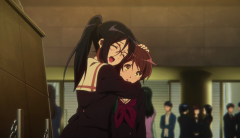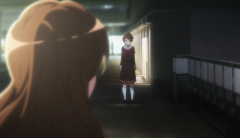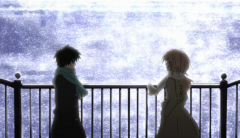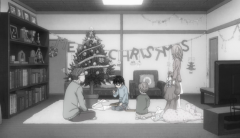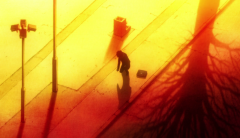This series is, in retrospect, a really appropriate title that speaks to the very spirit of noitaminA block: an adult drama slice of life about the making of dictionary that surely don’t try to target the young audiences. Sound as dry as it is, Fune wo Amu’s actually one of the strongest noitaminA show come out for the last few years (not that the TV programming have been doing well to begin with). In Fune wo Amu, we follow Majime as he transferred to the dictionary department with the main mission is to publish a new dictionary called The Great Passage, along with the small team. That process, of course, taking time: 10 years, 20 years, you call it. The series is divided into 2 parts, the first follow him as he begins on the project and detailing how his normal workplace look like, the second part jumps 13 years later at their nearly-publishing phase. The decade-long efforts that he and the people he worked with delicate themselves in is something that you rarely seen in this anime medium.
I will be the first to admit that making dictionary doesn’t sound like an interesting subject matter to me, not because there isn’t anything great about it, but mainly because the subject will get dull very fast. But even I am surprised to say that the show keeps me hooked from start to finish. The tricks of how the show nailed it in making dictionary interesting are 1) the way the show managed to demonstrate how important dictionary is and 2) show us how those characters giving their all to make it possible and 3) point out to us the love for words and that each dictionary has, in fact, each own personality. For the first point, the show frames dictionary as the passage for everyone (not “everyone” everyone. Japanese people only) to communicate and connect to each other. Words are the way to express our thoughts, our feeling, so using the right words at the right time can make others understand the context completely. The Great Passage is one of a way to connect that gap between what we want to express and what we actually express, between one person to another. It is irony, but still fitting to that theme, that our main character Majime is a socially-awkward type. He has an extended knowledge about words, but he’s struggle to express what he wants to say. His love letter to Kaguya perfectly demonstrate his geeky nature, as even Kaguya herself can’t figure out it was a love letter, but being moved nonetheless.
But the beauty of dictionary means nothing if we don’t see the love and efforts of people behind it, and thanks god, this is where the show shines as well. Even in the wear-down corner of the otherwise-busy publisher, with so few people in it, it’s their passion to the project that counted the most. As in a line in La La Land (great film! Go watch it), people are enthusiasm about it because YOU are passionate about it. The love that you have can affect other people in the most positive ways. In the series, Nishioka, Majime’s co-worker, isn’t a type of person for this job. He’s socially active, care for others but never really interested in words. Through Majime’s passion though, he started to feel the joy of his works and committed himself fully to make The Great Passage the reality. Other characters, Mr. Araki and Mr. Matsumoto, we can feel their whole lives devoted in words, their meaning and they’re damn proud of what they’ve achieved. Last but not lease, the show successfully depicts dictionary as a creation, something akin to the work of arts. To be fair, think of it that way make the whole process makes much more sense too. The Great Passage is a brainchild of all the people behind the project, so everything has to be perfect, from the selection of words that eventually appear in the dictionary, the description process, down to how to choose designs, mascots and even page’s quality that best represent the personality of The Great Passage. That lead us to the painstaking task but ultimately rewarding of double-checking every single entry to see if there are any words missing. As the tasks done, the team (and ultimately, us) feel relieved that The Great Passage going to be a masterpiece.
Fune wo Amu, moreover, isn’t simply about dictionary-making process, it’s the show about people, too. As with the nature of dictionary, it’s a desire for connection that brings those people together. In the show, we witness how Majime and Nishioka, as vastly different as they are, can really bring the best out of each other. We can also follow Majime and his love affair, as quiet and poetic as it is, this is for me one of the best depiction of romance that I’ve seen so far for the last few years. The romance speaks to me because it grounded to reality, it’s beautiful because it is quiet, and isn’t it the best kind of relationship when you regard your spouse as a partner for life (well, for me it is). Even the new girl Midori fits into that pattern as well. Her struggle from being forced to transfer to the department that she had no idea of (you might not know but this happened regularly in Asian culture, especially 20,30 years ago, but I still have no idea why Nishioka had to hide his relationship with his co-worker partner), we see her from being distressed about the new workplace, come to really appreciate and love her job is nothing but a rewarding experience. Every one of the cast have their own different traits and characteristics, and that precisely the point that the dictionary (and the show by that extend) need all of their diverse voice in order to become multi-layered production.
If anything, the passage of time is the show’s main theme as it lingers in various forms throughout the show. The sudden time-skip, for example, signals us how everything is supposed to change (it’s 13 years for Peter sake), and yes, we can see there are some minor changes from the settings and the characters. But the sameness from the dictionary department’s office really tell us that in the room, time flows slowly; and really, that amount of time spent for making dictionary is nothing compare to how the dictionary might flourish for generations to come. In that 13-year gap, people leave, new people come in, it’s that cycle of life that make the show timelessness. Furthermore, Mr. Matsumoto unfortunate leaves us at the end of the show, but we know full well that the old plants gone in order for the new plants to blossom. Through every change, the words inside the dictionary will continue to live on and connect more and more people together as time goes on.
The show, although very well-pace, still has some flaws too. The subject matter is decidedly niche that unfortunately it will fly below the normal viewer’s radar. The passing away of Mr. Matsumoto before the time of the publishing is a tired cliché that for me bring an unnecessary regret to Majime. The animation as a whole, while serviceable enough and really don’t have many high actions, still a bit below par compared to your regular anime. Although we have a big time-jump, if the series meant to highlight the progression of making The Great Passage and the life of our main characters, I would’ve much preferred if they show us instead how they were doing along the way. I want to follow their journey from beginning to end (not the beginning and the end), and I don’t care one iota if they’ll successfully publish it or not, what I want is the ride to get there.
To sum up, Fune wo Amu, along with Shouwa Genroku Rakugo Shinjuu, are the titles that I’m really glad they are made after all. The older I get, the more I’m wearing off at high school comedy anime and high action anime, the more these titles speak to me on a personal level. I’m really glad anime still have platforms like this, the show that tripped out all the spectacular over the top visuals to instead telling the story it wants to tell. What we have in the end might seem nothing much plot-wise, but the sophistication behind the story and the love that the people behind it put into are something that I will remember fondly.



